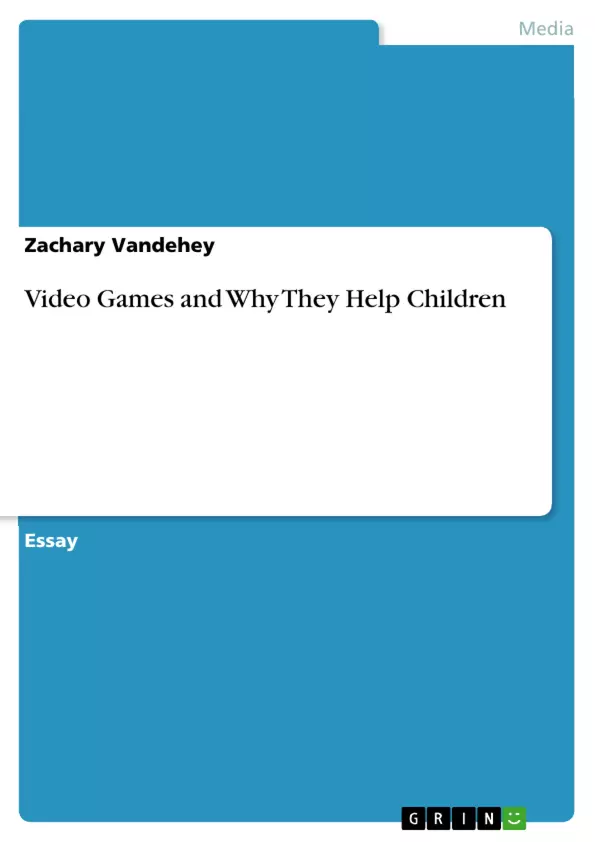A look into the lighter side of video games and their benefits on the maturation of a child. This paper aims to denounce accusations that video games only hinder the development of a child's mind, and preaches several reasons why the opposite is true.
Video games are beneficial to the maturation of a child’s cognitive processing, they are constructive regarding a child’s self esteem and encourage a favorable self-image, and lastly they provide unparalleled inclusive opportunities for children to thrive socially. With education playing such a pivotal role in an adolescent’s upbringing, video games bring forth a unique, productive, and wholly efficient template for learning.
Inhaltsverzeichnis (Table of Contents)
- Virtual Learning
- Cognitive Processing
- Self-Esteem
- Social Opportunities
- The Cognitive Advantages
- The Emotional Advantage
- Social Advantages
Zielsetzung und Themenschwerpunkte (Objectives and Key Themes)
This paper explores the argument that video games can be beneficial to adolescent development. It aims to demonstrate that video games can positively impact cognitive processing, self-esteem, and social skills.
- Cognitive benefits of video games
- Emotional benefits of video games
- Social benefits of video games
- The impact of video games on adolescent development
- The potential of video games as an educational tool
Zusammenfassung der Kapitel (Chapter Summaries)
- Virtual Learning: This chapter introduces the argument that video games can be beneficial to adolescent development. It discusses the historical evolution of video games and the controversy surrounding their potential negative effects. The chapter argues that video games offer a unique and effective method of learning, particularly in terms of cognitive processing.
- The Cognitive Advantages: This chapter delves deeper into the cognitive benefits of video games. It explores how video games can improve problem-solving skills, encourage critical thinking, and promote the ability to learn from mistakes. The chapter uses the example of puzzles and challenges within video games to illustrate these points.
- The Emotional Advantage: This chapter focuses on the emotional benefits of video games. It explains how video games can foster a sense of achievement, build self-esteem, and encourage vicarious learning. The chapter draws on social-cognitive theory to support its arguments.
Schlüsselwörter (Keywords)
The main keywords and focus topics of the text are video games, adolescent development, cognitive processing, self-esteem, social skills, vicarious learning, and the potential of video games as an educational tool.
Frequently Asked Questions
Do video games hinder a child's development?
Contrary to common accusations, this paper argues that video games can be beneficial to cognitive processing, self-esteem, and social maturation.
What are the cognitive benefits of playing video games?
Video games can improve problem-solving skills, encourage critical thinking, and help children learn from their mistakes through interactive challenges.
How do video games affect a child's self-esteem?
They can foster a sense of achievement and build a favorable self-image through emotional engagement and vicarious learning experiences.
Are there social advantages to gaming?
Yes, video games provide inclusive social opportunities that allow children to thrive socially and interact in collaborative virtual environments.
Can video games be used as an educational tool?
The research suggests that video games offer a unique and efficient template for learning, serving as a productive addition to an adolescent's upbringing.
- Quote paper
- Zachary Vandehey (Author), 2016, Video Games and Why They Help Children, Munich, GRIN Verlag, https://www.grin.com/document/350642



